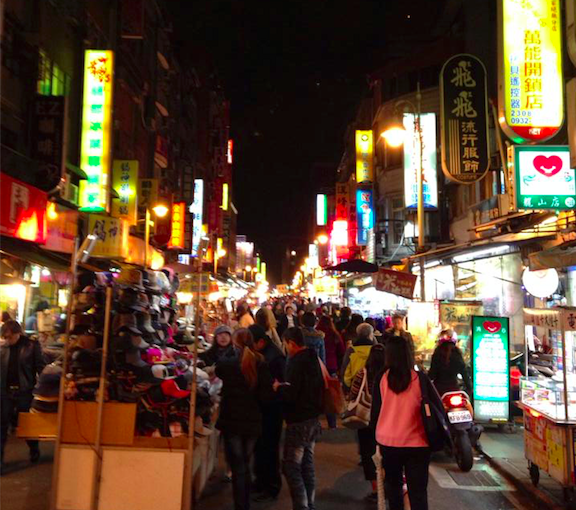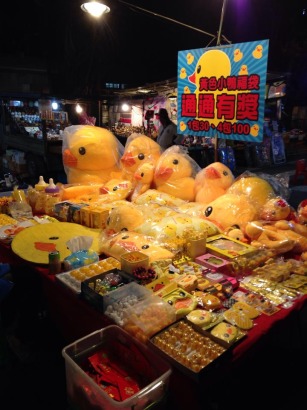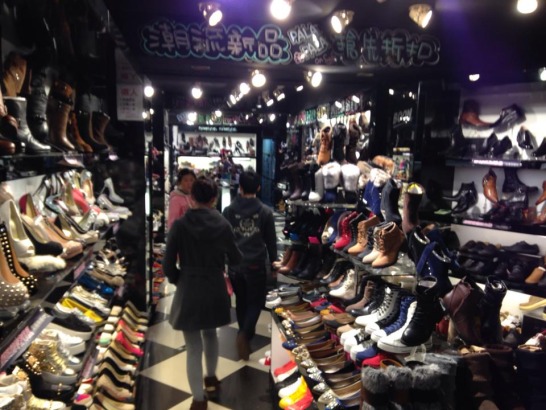How to Shop in Asia’s Night Markets
As someone who’s currently starting their own business, I have a huge respect for anyone that’s willing to put themselves out there and sell — providing value for a price. It’s hard to constantly face the rejection and always drive towards the sale.

And then you go to Southeast Asia, and all of your previous notions of buying and selling get shattered. Night markets are crowded, loud, bustling places and for many people are the highlights of their trip. But most Westerners have no idea how to handle themselves in one and often make purchases based on their perceived value, oblivious to the actual cost of the goods they bought.
In polite terms, they are getting ripped off.
So given the approach of the holiday season, I’ve compiled a guide to keep in mind the next time you’re in a night market and eyeing that “cashmere” scarf:
1. Headphones work wonders for your sanity
The first thing you’ll notice as you walk through is that every shop keeper wants to talk with you, get you into their store and trying things on. You’ll hear “my friend,” “handsome man/woman,” and pretty much any other absurdly nice in-your-face tactic to get you to focus your attention on them. As soon as you do, you’ll spend 10 minutes just trying to extricate yourself while they show you endless samples.
The solution? Headphones. It will keep you from getting worn down and in a bad mood, and focused on only interacting with goods and folks when you’re actually interested in buying - not just glancing their way.
I usually pop in some EDM and dance through the aisles. (In fact, I like this tactic so much, I’ve started to use it in US shopping malls and retailers like Banana Republic.) It’s so nice not getting stopped every 5 seconds and it often brightens people’s day to see a foreigner do something weird and fun.
2. The shops all sell the same stuff

If you’ve been to enough night markets, you’ll start to notice that they tend to sell the same stuff. Often it will be purses and handbags, scarves, shoes, wood carvings, DVDs, nondescript exotic knick knacks. Eventually they’ll start to repeat themselves and you’ll begin to think that you have some options to buy.
Maybe one place will give you a better price than another?
But you also begin to understand that some shops have LITERALLY THE EXACT SAME INVENTORY. And if you want something “slightly” different, no dice. Maybe you start to haggle, but here are some other things you should know
3. Most of the goods are not produced locally and were likely bought on Alibaba
I made the mistake of mentioning this to another tourist once. Her face just went pale and I probably ruined her night. But the reason why all that inventory is the same is because each of these stalls has the same set of suppliers.
It’s not some decades old verbal contract their grandfather made with the local artisan’s mentor during colonial times, it’s a wholesale distribution logistics operation like Sysco in the US.
Literally a guy or gal will come through the market mid-day with a huge cart of handbags, and shop keepers will buy 10 or 50, whatever they think they can sell for the week given the season and traffic.
Moreover, you can often find much of the goods sold on Alibaba (where typically you have to buy 100+ units but you get deep discounts). Well Alibaba works all over the world, so if you have 5 or 6 friends also working the market, you can easily “go in” together on an order and split the costs. Take a picture of the tag some time and search, I bet you’ll find it.
Remember that for many tourist destinations — Mexico, Thailand, Turkey etc. — it’s still cheaper for them to buy wholesale goods produced in countries with even cheaper labor. There are entire factories in China and Vietnam making Sombreros and Mexican blankets, Turkish Tea Sets and Thai silk garments. I kid you not. Think you’ll find those items in the home country? Nope, they’re produced far from where tourists will ever venture.
4. Many “competing” stalls might actually be owned by the same person or family
This one really throws a lot of westerners for a loop. So we’re used to mergers and acquisitions of blue chip stocks, but people seem generally shocked when I tell them that this happens in markets that have been around for over 100 if not several hundred years.
Really? It’s surprising that people take such a Rudyard Kipling approach to travel, but vendors in the night markets are just as savvy/ruthless businessmen and women as Mark Cuban, Donald Trump and Warren Buffet and consolidation deals happen all the time. This also tends to happen in “nightlife” districts all around the world.
They make deals, alliances, partnerships and buy out their competitors. Obviously all the shopkeepers know each other. They spend every day together. You may not realize it, but they aren’t competitors, they are coworkers or even family.
Since the family structure can be very different to what Westerners are used to, it’s not at all uncommon for Grandpa to own the whole operation, Grandma does the books, their niece manages the market and their son in-law deals with suppliers and procurement and grandchildren, nieces, nephews, in-laws, children of friends to work the shops themselves.
So those 15 shops all selling really similar stuff right next to each other (so you may puzzle “how do they compete? It must be vicious!”) are all ONE GIANT OPERATION.
5. Understand that anything branded is likely either fake or outside of manufacturing margins (and should cost 5-10% the price of the real thing).

I thought this was assumed, but some people actually think they are buying real designer shoes and bags!
When I lived in China, I bought a bunch of acrylic scarves with a friend. We bought 25 scarves for 20RMB each (about $2.80 at the time). They had a Burberry tag on theme and were marketed as cashmere scarves. Obviously we knew better (acrylic is still really soft) and had been to markets plenty of times before (hence why we bargained in bulk), but towards the end of the sale, I asked the shopkeeper what’s the most she sold a scarf for. She replied “about 2,000 RMB” or $286!!
After all, Burberry scarves retail for $400 in the states and these “fell off a truck” so the buyer thought they were getting a great deal. She made a margin on us at $2.80, but you’re talking 10000% margin.
Man, I wish I had that.
So understand that a vast majority of branded merchandise you see, whether Gucci, Prada, Rolex, etc. absolutely are not the real thing. The fakes are good — very good in some cases — but don’t expect that Rolex or iPhone you bought on the gray market to work in a year. Or DVDs. (Really, you still buy DVDs!?)
You will find instances where the clothing or bag is good quality (you REALLY have to know what to look for) and it’s possible that it’s a sample or manufacturing overflow that didn’t meet the tolerances requested by the retailer (all those GAP shirts or Nike shoes aren’t exactly the same size, those that are too far out of bounds - assuming they’re inspected - they might get dumped on a market). I like shopping for things of utility, so a bag is a bag and I don’t really care if it’s a knockoff, famous or fictious brand.
But brand has a very different meaning in many parts of Asia, and being branded — even if it’s a made up or mispelled brand — typically carries more cache than non-branded merchandise. So sticking a logo on it is a feature, regardless of quality and would usually be seen as an enhancement.
5. Questions about your name, where you’re from and where you’re staying are being used to size you up
You’re probably aware that you can bargain in most night markets, but most people do it very wrong. They don’t take time to watch other people, particularly locals, to see what ballpark is reasonable for goods. People overestimate 10x in many cases. Watch money change hands to see whether you should be reaching for 100’s or 10’s.
Shopkeepers are particularly savvy about this and know they can charge differently depending on if you’re a local and likely to be back next week or a visitor unlikely to return again.
Simple, friendly questions like “what’s your name?” “Where are you from?” can be used to size you up pretty quickly. Saying you’re from Eastern Europe or South America will probably get you a better price than mentioning you’re from Norway, Switzerland or the US. Don’t mention you’re staying at the Park Hyatt, “with friends” is usually a better choice.
If a billionaire flew to your house in a helicopter, flanked by assistants, dressed in a nice suit and asked how much he’d have to pay to buy your I♥NY coffee mug (and he clearly had never seen one before) — would you really quote him $5?
6. Bargaining requires a “reasonable range” and rational expectations
Even then, many people approach bargaining with a price they are willing to pay, and get really frustrated when the shopkeeper gives them a higher number and won’t budge. Or they ask the shopkeeper the price and just pay it, considering it rude to counteroffer. You almost always have to offer a price much lower than your willingness to pay and work up, while the shopkeeper works down, tit for tat. As a buyer, talk about perceived imperfections, don’t sound like you’re in a hurry. Mentioning that you’re moving there or walking away will likely drive down price as low as you’ll be able to get, but you will never get the rate locals will pay. Consider it the foreigner’s “discount.” A friend of mine usually uses “Can we take a photo together?” as a bridge to make the strike price work. I think that’s a pretty awesome win-win.
At the other end of the spectrum, you’ll see people huff and puff and squabble over an amount that would be embarrassing in Western countries. Like a $0.10 surcharge for a 3 mile taxi ride. Just suck it up and pay the visitor’s premium. That money is likely more useful to the shopkeeper or driver than to you. Don’t let good be the enemy of perfect.
7. Always inspect the quality of the item you buy and don’t assume it’s the same as the “floor model”
Lastly, when you agree to a purchase, make sure it’s for the exact item you’ve been examining. They may offer to switch it out for a wrapped model, but be very careful as that can be a convenient way to unload damaged inventory. You only unwrap in when you get home and find a stain or tear.
I don’t mean to sound negative and I actually really enjoy night markets, but I came across a number of people on my last trips that probably could have benefited from these tips, so I thought I’d write about it. People are just trying to make an honest buck (or riggit or rupee), but information is power, so don’t go in unarmed.
And remember, all sales are final!
Have a shopping story while traveling? Comment below!

I was once almost killed by a shop owner in the Istanbul Bazaar… I made the mistake of laughing at his “low price”. His anger was palpable, and were it not for my husband who ACTUALLY said, “Don’t mind her, she’s only a woman!” to get me out of it, he might have hit me. We ended up with an overpriced tea set…….
Yeah, I’ve had a number of those “turn at the drop of a hat” type of situations more often than I can count (“What do you mean you aren’t going to buy!?”). I’m all for legit businesses trying to make cash, but don’t respond well to strongarming. Hence, headphones. — There are a few places I now avoid because I feel the general spirit of a “marketplace” has been lost and you will only be viewed as ignorant walking ATMs that are expected to drop a ton of cash. ::Sigh::
Some fakes do last. Got a decent fake rolex in Shenzen a couple of years back, still going strong. I took it to a jeweler to have the band fixed and even he commented how good it was. Worth every penny 😀
Right, but you set your expectations for a fake Rolex. If you thought it was real, breaking anytime in the next 20 years would probably be unacceptable. I do agree with you that the fakes are getting better, particularly in more developed trading markets where factory overstocks are likely to appear (Shenzhen, HK, Taipei)
the first picture of the post, what is city night market in what country ?
I think they’re all from Shilin Night Market in Taipei (admittedly almost a year old). I lost a vast majority of the photos I took from February onward this month, so those seemed to make the most sense for this article. I did retain many food pics from that trip, but that’s probably a completely different blog
Will have two nights coming up in bangkok - what’s the recommended night market(s) worth checking out? Haven’t yet picked a place to stay and was thinking for one of the nights would base it on proximity of night market.
Silom and Sukhumvit are the most accessible, but they are catering mostly to visitors since they are right next to a preponderance of the hotels. Might be the best option if you’re only staying one night.
For the best food, you should check out places on the north and east sides of the city. I wandered around the pop-up carts around Mo(r)-chit last time I was there and it was head and tails better than what you’ll find near the touristy areas. I’m sure other folks might be able to chime in on particularly good hotspots. Wasn’t terribly fond of Khao San Rd. other than a bar or two there. Things were definitely priced at the foreigner’s discount.
Check the pratunam market. IT is easily the cheapest market you will find. I picked up some awesome (and huge) suitcases here for $40 each. They have held up quite well. Clothing is really cheap here too. Ties for $2-3.
Eric, your a racist dbag, why are writing this crap about Asians, why don’t you review Ireland and shepards pie, tool
how is this racist lol what’s wrong with you? this is mostly true and frankly seems like it would be informative to westerners
Eric GREAT write up, and I couldn’t agree with you more on all the good points you’ve made, especially about been looked at as a walking ATM machine. I do enjoy visiting Asian Night markets for the cool vibes that they have and the plethora of items that they offer even if I don’t buy anything. There are some markets where the sellers are much more aggressive than average and that’s a major turn off for me. I learnt a long time ago NOT to tell my newly found ‘friends’ that I’m from the US because they ARE sizing you up and if they perceive you come from a ‘rich’ country, the price of any item just went up 100%. Instead I mention that I’m from Bolivia and funny enough, I’ve been asked more than once if it’s in Africa, to which I always reply: ‘Yes, so you know my country!’
Yeah, it’s easy for some of this behavior to really leave a sour taste in your mouth. But it’s highly correlated with tourist volume. Partly why I had a blast in Brunei and Sri Lanka and much prefer both those places over Bali (::gasp:: runs for the hills! :D)
Absolutely and regarding those two destinations that you mentioned as places that you enjoyed visiting; well, they’ve been on my list for awhile now especially Sri Lanka. I’ve heard great things of late. Thanks for sharing.
Best advice ever - when you find something you like, offer a low amount and then walk away. You will always get called back at a lower price.
Minor quibble: “the perfect is the enemy of the good” General Pattons”. redo of Clauswitz “the fog of war” or today’s “Gitter done”